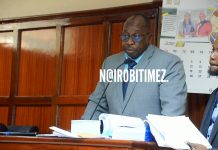
Chickengate’ scandal was based on innuendos, insinuations and falsified inferences. The public was made to believe that commissioners received money from Smith & Ouzman, the media has censured, denounced and criticized us without the benefit of factual information; IIEC.
Energy Cabinet Secretary Davis Chirchir speaking to journalists after he appeared before the Ethics and Anti-Corruption Commission (EACC) over the ‘chicken’ scandal.(FILE PHOTO)
BY THOMAS KARIUKI.
The ‘chickengate’ scandal that has seen high ranking state officers including cabinet secretary for energy Mr David Chirchir being axed from the government and several other officials summoned to the anti-graft agency was false.
This is according to a press statement of Tuesday 15 2016 on Daily Nation, page 33 by IIEC commissioners on the Smith & Ouzman trial in the United Kingdom.
The statement said that “it is evident, from available documents and the UK court testimony that the case against Smith &Ouzman was in respect of incidents in Kenya, Mauritania, Somaliland and Ghana. For Mauritania, Somaliland and Ghana the charge against smith & Ouzman officials was bribing public officials. With respect to Kenya, the charge was one of conspiracy to corrupt public officials.
The conspiracy was that of the accused persons and their agent in Kenya. It was not a case of corruption in which any of the IIEC commissioners had taken part.”
It continued to say that “it thereof incorrect, erroneous and dishonest for anyone to claim that the officials of Smith & Ouzman were jailed for bribing IIEC commissioners, or that IIEC commissioners’ received money from Smith & Ouzman or their agent. The false and continuous reporting of this case does not alter the facts of the UK case or the conduct of the commissioners. We should say that the documents at the EACC should be open for anyone to see.
According to the statement, to prove the case of conspiracy to corrupt public officials the prosecution relied on emails between the officials of Smith & Ouzman and their agent. In these emails the agent asks for money to induce IIEC commissioners. However in paragraph 14 of the Crown Opening statement the prosecutor makes a significant deposition that demonstrates the IL-legitimacy and wrongfulness of the media reports.
“It is the agreement between the defendant and the relevant Smith & Ouzman agent to make these payments, which is critical, whether payments were infact made or not,” the prosecutor says.
The statement continues that the prosecution in the UK did not endeavour to prove that the agent paid any money to the commissioners. Indeed this was not their case. To prove conspiracy, it was enough to show that money was paid to the agent who had asked for it to pass it to the commissioners. But did the agent actually bribe the commissioners?
IIEC said that they looked into the email correspondence between the Smith & Ouzman and their agent in Kenya.
They say, “what is glaring missing in this train of emails is any communication of whatsoever nature between the agent or the officials of Smith & Ouzman and any commissioner either on email, telephone or personal meetings in which any commissioner prompts, solicits, requests or negotiates or in any way asks for any monetary or other favor from the agent or any officials of Smith & Ouzman.”
The alleged spiteful scandal has seen the IEBC chair Isaac Hassan, former chief registrar of Judiciary Ms Gladys Boss Sholei summoned to the Ethics and anti-corruption commission offices to shed light on the suspect transactions that have also threatened to soil the image of the Independent Electoral and Boundaries Commission ahead of the 2017 national polls; The body is responsible for conducting elections in Kenya.
The statement on the daily also says that there was equally no communication, at all, in which the agent invites any commissioners to give the money. “Similarly, there is no communication in which any commissioner asks for money or acknowledges receipt of money…however the absence of any such communication is clear prove that there was no plan to pay such bribes. The reality is that no such bribe had been sought or was expected.”
It continues to say that the email correspondence suggests that the agent was receiving money to his account after which he promised to disburse it to the commissioners. How was he doing this?
IIEC invited investigators to check on the commissioners’ telephone and email communication to verify whether the agent communicated with any of us. “We also invited them to check our bank accounts to see whether the agent transferred any money to any of us.”
The investigators who IIEC says is not known to any of the commissioners and had not personal or official dealings with them found that there was not in existence any telephone or email communication or personal meetings between the agent and the commissioners.
They also invited EACC to check out whether the findings were genuine.
IIEC says that the agent was involved in namedropping, puffing and flaunting to increase his commission.
A trip said to have been made by the commissioners to the UK which is alleged that the Kenyan officials traveled to negotiate bribes was also denied in the statement.
“Quite to the contrary, by the time commissioners traveled to the UK, the procurement procedures are long finalized. The award has been made and only printing of papers remains. Any suggestion also that Smith & Ouzman paid for this trip or the accommodation of the commissioners is untrue and invalid,” it says.
According to IIEC, the alleged ‘chickengate’ scandal was based on innuendos, insinuations and falsified inferences. “The public was made to believe that commissioners received money from Smith & Ouzman, the media has censured, denounced and criticized us without the benefit of factual information.
The reality is that no commissioner negotiated or received any money from Smith & Ouzman or their agent.






